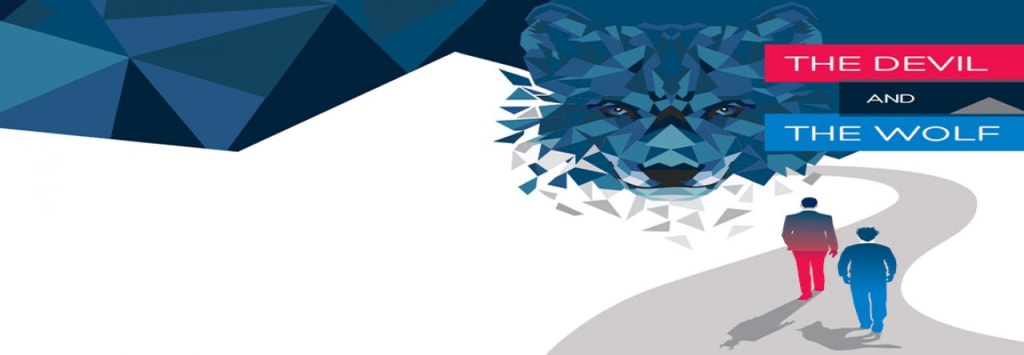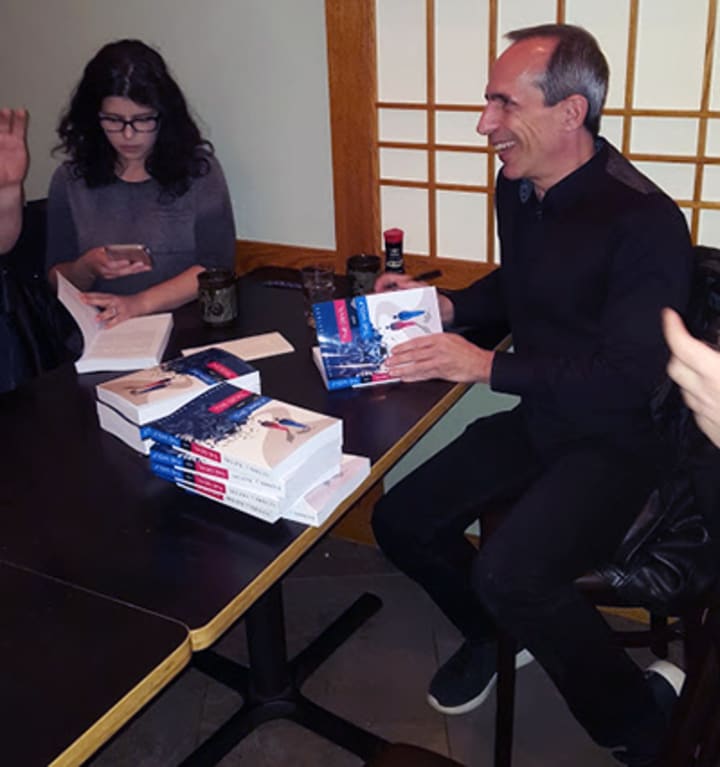A Brooklynite Author Who Gives Neil Gaiman and Terry Pratchett a Run for Their Money
A review of The Devil and the Wolf by Richard L Pastore

I’m delighted to have read The Devil and the Wolf — a dark comedy fantasy by Richard L Pastore.
It’s worth a read if you love Christopher Moore, Neil Gaiman, or the late Terry Pratchett — and who doesn’t love them?
Demons. That’s who.
To be honest demons are most likely rather fond of these writers, and of comedy fantasy in general, but I digress.
If it feels like I’m stalling that’s because I am. What’s more I’ve got a horrible confession to make. Are you ready?
I’ve had this review to write for over a year. A year. I’m going to Hell; please excuse me whilst I pack.
At least the fact that I’ve been thinking about the book for over a year tells you something good about it.
Don’t get me wrong, there’s nothing wrong with the book. But there’s definitely something wrong with me as a writer and with the idea of book reviews in general.
What’s the purpose of a book review? I mean it. What’s the point? I realise that’s not the best opening gambit for a book review but please bear with me.
For the past year I’ve tried and failed to describe why you’ll get a kick out of this book — even though I know you will.
Every time I sat down to write I’d see the mental image of someone carrying a flaming torch and casting light in the dark. You know, real Indiana Jones type stuff.
And that’s the point to me — as hokey as it sounds — to shine a light on books that are worth reading. To say: “You there, come here, read this.”
What good’s a book review except as a torch to lead readers to discover a book they wouldn’t have otherwise found?
That’s why I’m reviewing this book. I want to shine a light on it. But dark things tend towards darkness. And the funny thing about this book is that it seems to prefer hanging out in the shadows.
Judging by the other reviews that I’ve read The Devil and the Wolf is dear to the hearts of everyone who reads it. And it’s easy to understand why once you meet and fall in love with the characters.
But it’s not meant for everyone. It’s something of a well-kept secret. And, like all good secrets, only a select few seem to know about it.
It’s the sort of book that has a coterie of devoted fans and gets passed from person to person in secret. Those that are in the know read it and pass it on to their friends.
You see the only thing I want you to get out of reading this review is that you buy the book and read it. So go do that. Right now. I’ll wait.
If you’re not into this kind of stuff? That’s ok. You can read it too. I won’t judge you. That was the sound of me not judging you. But it’s not for you.
Oh, I know, writers want everyone to read them.
What I’m saying is that this book deserves to find its way into the hands of the right readers. The passionate fans of this particular genre.
The right type of reader, left to their own devices, will devour this book in one sitting.
Christopher Moore, Neil Gaiman, Terry Pratchett. If your bookshelves are full of these writers — their books, I mean, not their corpses — then buy this book. If you covet the bones of Roger Zelazny you should definitely check it out too.
Especially if you read and adore most everything by them that you can get your grubby little hands on. Because then you’re the right kind of reader. You’re one of the ones who will get it.
The ones who will recognise the names of demons. The ones who will talk at length about the metaphysics of the book. The ones who will appreciate its clever take on the world of demons and angels.
The ones who will laugh at all the jokes.

The Devil and the Wolf is the debut novel of Richard L Pastore, a Brooklynite, currently based in New Jersey.
Pastore has a kaleidoscopic imagination. a devilish sense of humour, and an encyclopedic knowledge of the arcane. I mean that in a good way.
To call his first novel ambitious is an understatement.
The devil Mephistopheles is one of the Princes of Hell. Lucifer is his boss but he’s the right hand man; the one who gets things done.
Heaven and Hell used to be at war with each other but have reached a sort of uneasy peace. They spend most of their time bickering instead of trying to destroy each other.
There’s a lot of bad blood between demons and angels; none more so than when it comes to the issue of humans.
They squabble over trivial details like the meaning of human life. What is the true nature of man’s soul and what does it mean to have free will?
How come God loved humans more than angels? After all they’re little more than talking monkeys. Why did he give them free will?
It’s such a contentious issue that Heaven and Hell must always hold humans to account. It’s the only way they could agree upon to keep the peace down through the ages.
This is why Mephistopheles has to perform a Humanity Test. It’s his job to put the talking monkeys through their paces.
Mephistopheles picks a person and offers to fulfil their wishes. They must make a deal with the devil in exchange for what they want.
Heaven and Hell kick back and watch how things play out. Then a panel of demons and angels debate about whether humanity is good or evil based on the outcome.
The Humanity Test never ends because Heaven and Hell never seem to reach a consensus. Mephistopheles picks the candidates. They judge them. And the wheels on the bus go round and round.
Needless to say Mephistopheles is sick to the back teeth of this.
He doesn’t like the Humanity Test. The angels put him up to it in the first place and it doesn’t sit right with him.
He resents the imposition of Heaven telling him what to do and thinks it’s unfair to the humans.
He’s even started to feel a strange sort of affection for humanity. This is something that his boss would be none too pleased about should he ever find out.
So the devil comes up with a plan that will throw a spanner in the works and stop the Humanity Test once and for all.
Mephistopheles decides to turn a wolf into a human. If Heaven and Hell can’t tell the difference then the Humanity Test falls apart.
The novel begins as the devil finds a wolf in the wilds of Montana and cuts the deal.
The wolf becomes JR Wolfe — yes, he knows how that sounds — but it turns out the devil has bitten off more than he can chew.
That’s an excellent pun and you know it.
JR is so much more than the devil had bargained for. All dogs are good dogs but, now that he’s human, this wolf aims to misbehave.
Before you know it JR is a businessman, getting up to mischief, and chewing on the devil’s furniture.
I hope that’s enough about the plot to whet your appetite. As for what happens next you’ll have to read the book to find out.
The devil is in the details. Do you see what I did there?
Suffice to say this might be one of the few places where it’s actually permissible to say “And then all Hell broke loose.
No one gets to know what I know and what I’m thinking unless I say so, and even then, don’t be so sure.
I used to teach Creative Writing to young people on residential courses — I swear to god this is relevant.
One time I confessed to my students that I’d never managed to get into reading Terry Pratchett.
They said: “We forgive you” but gave me Good Omens to read as homework.
They chose Good Omens because it was co-written by Neil Gaiman who they knew I already liked.
So I read Good Omens and I loved it. The angel Aziraphale and the demon Crowley are my favourite ‘mismatched buddy’ characters.
I mention this because Good Omens was my touchstone when reading Pastore’s novel. There are a lot of similarities between these books and what I like about them.
The devil the wolf remind me of the demon and the angel even though they’re different characters. That’s how fond of them I am.
The friendship between ‘Meph’ and ‘JR’ is central to the success of the book. Their comical interactions are, hands down, my favourite bits.
Among a large supporting cast of demons and angels the standout, for me, is Lilith. She’s a notorious demon, thought by many to be the first woman, and as smart and sexy as Hell.
She understands Mephistopheles, flirts with the wolf, and can run rings round both of them.
She understands him. Of all the beings in creation, this is the one she totally gets.
There are also some human characters. The most notable are Delia, Jenna, Levi, and Rob, who serve much the same function as a Greek chorus.
They’re not there to make up the numbers, so much as stand-ins for humankind, but they do tend to play second fiddle. Mephistopheles even dubs them the Scooby Gang.
The book also presents an interesting theology. The war between Heaven and Hell ended in a stalemate. Demons and angels are two sides of the same coin.
Heaven and Hell are in a shambles. Their bureaucracy is more like the European Union than what you’d find reading Dante, Milton or the Bible.
Today this vision of Heaven and Hell seems like a prescient and damning critique of Brexit. This was no doubt unintentional.
If anything I wanted the book to have more of a satirical edge.
The best fantasy and science fiction usually acts as a commentary on the present. But the fictional world has to correlate to the real world for that to work.
The books is not without some minor flaws. This is little more than nit-picking on my part. Or should that be flea-picking?
It’s a sprawling work that contains enough great ideas to fuel a full comedy fantasy trilogy. So much so that I would have rather seen them played out over three books.
Things go a little too according to plan to be suspenseful all the way through. Mephistopheles is so cunning that he always appears to be in control and one step ahead of everyone else.
For all the promise of fire and brimstone the world is more likely to end in an argument than armageddon. But that’s because demons and angels are a fickle bunch.
If this book was the first of a trilogy — as it stands — I’d read the rest in a heartbeat. I’d love the excuse to hang out with these characters again. It’s also very funny. Did I mention that it’s funny?
A good time will be had by anyone who reads The Devil and the Wolf. A wolf makes a deal with the Devil. What more do you want?!
The book includes a fascinating postscript about its origins, development, and literary influences.
For all my talk about Neil Gaiman Pastore’s biggest influence is Christopher Moore.
I like that Pastore is a careful writer. He respects the craft. This level of care and attention is evident on every page.
The Devil and the Wolf was a long time coming. Pastore developed the characters of Meph and JR over several years. He even wrote vignettes about them for his friends.
Good Omens and American Gods have both recently made it to the small screen after many years.
I hope that this book will now find a larger audience than it did when it was first published.
I also hope that Richard forgives me for taking so long to write this review.
I’d find it much easier to review books if I didn’t read them first. Especially books that I enjoy reading. My head gets so full of thoughts about what I loved that I don’t know what to say.
Sorry about that.
No doubt by the time you read this you’ll be able to read his next book; which I do have it on good authority that he’s working on.
Good things come to those who wait.
Pastore has a loyal circle of readers. You can buy the book here or visit his website if you want to join the pack.
James Garside is an independent journalist and writer. Join Chapter 23 for the inside track on all their creative projects and insights about life, work and travel. This post contains affiliate links. If you use them I may receive compensation at no additional cost to you. All views remain my own.
About the Creator
James Garside
NCTJ-qualified British independent journalist, author, and travel writer. Part-time vagabond, full-time grumpy arse. I help writers and artists to do their best work. jamesgarside.net/links






Comments
There are no comments for this story
Be the first to respond and start the conversation.